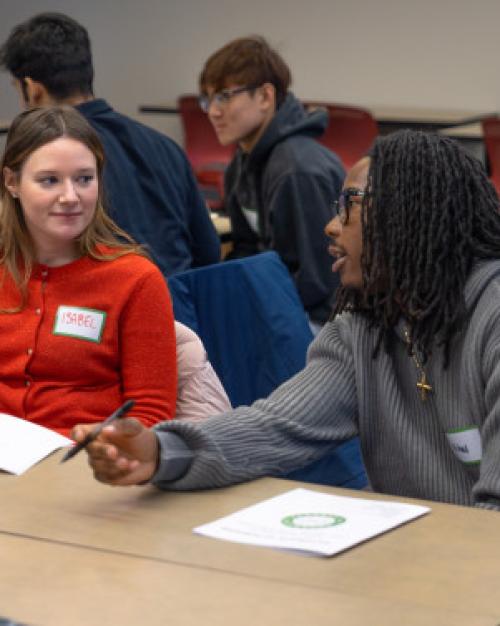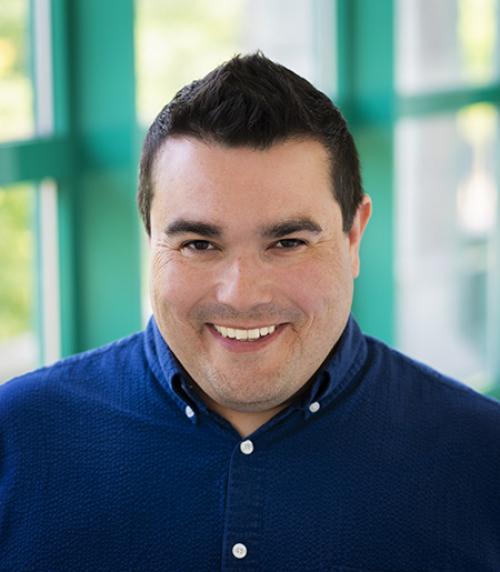Before Jeffrey Palmer ever held a video camera or took a filmmaking class, he felt pretty confident that he would be a good at it. So he bought some good equipment, put together a DVD with a series of shorts and applied to the country’s top film MFA programs.
He got into all of them.
Now, as a new film professor in Cornell’s Department of Performing & Media Arts, with his first documentary feature film, “N. Scott Momaday: Words from a Bear,” chosen for this year’s Sundance Film Festival, it’s clear that perhaps his hunch was right.
Focused on films that offer people a glimpse into the life of Native Americans today, Palmer, who is Kiowa, likes to center his films on land, the creation of place, the diversity of people, the language, the music and the spiritual world.
“I found that my films touched people and they were able to connect,” he said, no matter what their cultural background.
As a young kid, Palmer was artistic and musical, thinking at various points he would become a painter or a professional musician. But in a college anthropology class at the University of Oklahoma, he saw the films of documentarian Victor Masayesva Jr., a Hopi filmmaker, whose work amazed Palmer.
“He was highly influential to me because it was the first time I’d seen these ethnographic documentaries created from an objective point of view,” he said.
Still, the idea of a career as a filmmaker seemed “a million miles away” for Palmer as a recent college grad, so he explored a few other paths, including enrolling for a semester of law school and then earning a master’s degree in Native American studies, where he completed a thesis on the exploitative treatment of Native Americans in early cinema.
Although he was invited to stay on for a PhD in history, his thoughts kept coming back to film, so much so that he took the leap of faith to send off those DVDs and see what would happen.
He chose the University of Iowa, and as an MFA student there, Palmer flourished, creating “a ton of work that has blossomed into who I am as a filmmaker,” he said. His thesis film, “Origins,” a magically realistic conversation between Palmer and his grandfather (who had passed away) set the tone for “Words from a Bear.”
“I believed in my mind that this was a real conversation, that he was in front of me talking to me,” he said.
He was hired as a visiting professor at Cornell and then moved into assistant professor positions in Oklahoma and at Syracuse University before returning to Cornell this year. He also kept creating work, including a short film, “Isabelle’s Garden,” which premiered at Sundance in 2015.
“We often see Native people shown outside of the regular space of life, either in museums or in the past. I want to show Native people living and breathing today,” Palmer said.
Along with Sundance, his films have screened at The Berlinale, Berlin Independent Film Festival, Winnipeg Indigenous Film Festival, Maoriland Film Festival and PBS Online Film Festival, among many other places.
For “Words from a Bear,” Palmer assembled a cast of artists with vastly different backgrounds to tell the story of Momaday, who grew up in New Mexico, was a doctorate fellow at Stanford University and won the Pulitzer Prize for Literature in 1969 for his novel “House Made of Dawn.”
Even though Palmer’s schedule is hectic these days with the release of the film and a new teaching position, he said he feels like he’s “in the prime of my life.”
“I love teaching. It’s really enjoyable to see these students become filmmakers,” he said. “At the end of the semester, they’re going to have a film that will screen in the Kiplinger (Theatre) and that’s going to change their lives.”
Palmer's film will be the focus of the second Arts Unplugged event in the College of Arts & Sciences, Oct. 17, at the Schwartz Center for the Performing Arts. The evening will begin at 5 p.m. with a public masterclass by Palmer: “How to Make a Sundance Documentary.” Following the masterclass, attendees can enjoy traditional Southwestern food during a reception and hear a talk by Gus Palmer, Jeff Palmer's father and a professor emeritus at the University of Oklahoma, and a conversation between Gus Palmer and Steve Henhawk, who is Cayuga and is teaching a new Cayuga language course on campus this semester. A film screening will begin at 7 p.m. and include a post-show discussion featuring both Palmers.
All of the events are free and open to the public and guests can choose which events to attend. Those interested in the film screening should secure a free ticket through Eventbrite.




